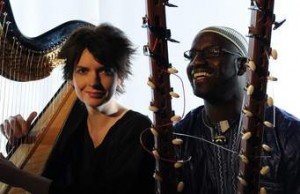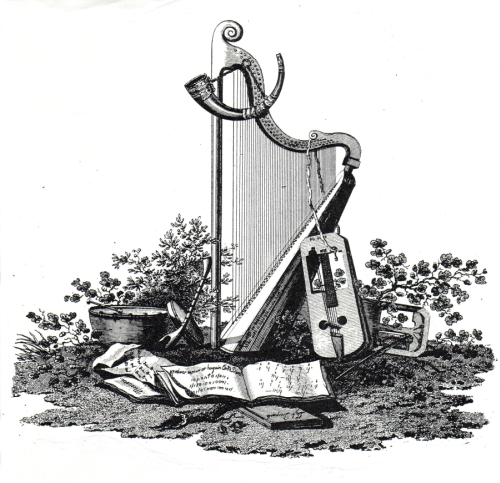 CATRIN FINCH & SECKOU KEITA: Acapela Studio, Pentyrch, April 28, 2017
CATRIN FINCH & SECKOU KEITA: Acapela Studio, Pentyrch, April 28, 2017
They have toured in Wales, the United Kingdom, Europe and all the world over, clinching the fRoots Album Of The Year award for Clychau Dibon and being nominated as Best Duo and Best Traditional Track in the Radio 2 Folk Awards; international harpist Catrin Finch and Senegalese griot and kora player Seckou Keita played a triumphant concert to a sell-out crowd in the Acapela Studio, which had a homecoming celebration stamped all over it. The audience went wild with delight from the second that they walked on stage, and when the show ended the fans gave them a standing ovation and yelled for more.
Catrin and Seckou see the Welsh harp and the 21-string West African kora as strikingly simliar. The musicians were brought together by producers Theatr Mwldan and Astar Artes, who have collaborated on a number of successful productions over the years; the harp is of vital importance in the incredibly rich history and culture of both Senegal and Wales. The kora, played by Seckou, is made from a dried gourd and fishing line; the Welsh harp, played by Catrin, is one of the most iconic symbols of a nation steeped in music. Both nations share a centuries-old bardic tradition of intricate oral history, expressed through music, song and verse.
Both players defy and confound those who like to slot music into convenient pigeonholes. Born in South Senegal, Seckou is both a member of the royal Keita dynasty from Mali and a griot, a traditional West African praise singer. He combines his kora with jazz, funk, rock, Indian classical and all manner of other musical styles – in fact, he has just recorded a track with amazing County Clare accordionist Sharon Shannon on her Sacred Earth album. Catrin and her husband, television producer Hywel Wigley, bought the defunct Horeb chapel and renamed it the Acapela Studio; “the Queen of Harps” is one of Wales’ leading musical ambassadors and one of the world’s finest players of this most Welsh of instruments. Her concert appearances with the world’s top orchestras span the globe, but her inspiring collaboration with Seckou turned the heads of the folk/roots fraternity as well.
The colonial language of Senegal is French, and the Senegalese National Anthem is ‘Pincez Tous Vos Koras, Frappez Les Balafons’ (Pluck Your Koras, Sound the Balafons – a wooden xylophone). The kora and the harp seem to jell and merge with one another with the magical, beautiful music, and Catrin and Seckou take the fullest advantage of the dreamy soundscape to which their composing leads. This is a wonderful collaboration, and it really works; they started off with ‘Bamba’, and the audience was lost in time and space. In no time at all, Catrin and Seckou ended the first half with the stunning ‘Les Bras de Mer’ (The Arms of the Sea). ‘Ceffylau’ (Horses) started the imagination racing, while ‘Tryweryn’ marked the most criminal acts of the last 50 years, the drowning of the Welsh-speaking village of Capel Celyn to provide needless water to the Liverpool Corporation. Catrin played with one hand on her electro-harp and the other on the concert harp in a breathtaking feat of virtuosity which really hit the nail on the head; let’s hope that the selfish arrogance and the bullying, corrupt attitude will have gone for ever, but Wales needs to guard against those who would destroy its very culture and language.
Seckou is a brilliant kora master; in ‘Future Strings’, he and Catrin artfully traded with each other in an audacious duo, which had the audience cheering and laughing. For the inevitable encore, the soothing, gentle tones of ‘Listen To The Grass Grow’ sent the crowd off to their homes contently; they just floated away on angelic, ringing notes. Throughout Catrin and Seckou’s set, the interaction is remarkable; this was an elegant, gently exquisite show, and it made a complete, satisfying night for the listeners. Clychau Dibon is the sole debut album, but Catrin and Seckou are in the process of recording another one; the only problem is naming the CD, and Catrin asked the audience to suggest a title. A third album is already in the pipeline.
The only issue is that the Acapela Studio is a minefield for those with mobility problems; once you negotiate the steep narrow path, which is the only entrance, and braved the steep step with no grab-rails, you are confronted with a dangerously narrow walkway and aisles which have been made totally impossible by speaker stands and chairs, until you perch yourself in the dreadfully uncomfortable hard chapel benches. People patiently queued in the narrow entrance to the foyer; I could not help wondering what would happen should a fire break out. Acapela books many inspiring shows, but it needs a little redesigning if it is to rival mobility-friendly arts centres and small venues across the country.
Mick Tems
